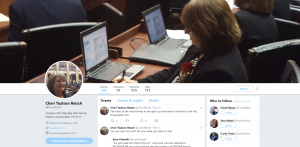Another Politician Probably Violated the First Amendment By Blocking a Constituent on Twitter–Campbell v. Reisch
 I’m shaking my head at how many politicians block their constituents on social media. What a terrible practice. Today’s case is particularly mind-blowing. Rep. Reisch is a representative in the Missouri House of Representatives tweeting @CheriMO44. The court describes the allegations:
I’m shaking my head at how many politicians block their constituents on social media. What a terrible practice. Today’s case is particularly mind-blowing. Rep. Reisch is a representative in the Missouri House of Representatives tweeting @CheriMO44. The court describes the allegations:
On June 22, 2018, Reisch tweeted about her appearance at a public event, at which her political opponent in the November 6, 2018 general election, Maren Jones, also appeared. Resich tweeted “Sad my opponent put her hands behind her back during the Pledge.” On June 23, 2018, Representative Kip Kendrick criticized Reisch’s tweet by commenting, “Maren’s father was a Lieutenant in the Army. Two of her brothers served in the military. I don’t question [Maren’s] patriotism. That’s a low blow and unacceptable from a member of the Boone County delegation.” Campbell retweeted Kendrick’s criticism in Reisch’s Account. After this retweet, Reisch permanently blocked Campbell from following or commenting on her Account.
FFS. Blocking a constituent because they retweeted a different representative (i.e., Reisch’s colleague)? Is this junior high?
Procedurally, the case presents itself as a motion to dismiss a 1983 claim. Substantively, the court says the following things:
- “The parties do not dispute that Campbell’s re-tweet constituted speech protected by the First Amendment.”
- “the fact that Twitter is privately owned does not preclude a finding that it is susceptible to the public doctrine analysis.” Cites to Packingham, Davison v. Loudoun, Davison v. Plowman, and Price v. NY.
- “the public forum doctrine applies to Reisch’s Twitter Account. In particular, the Court finds convincing the rationale in Knight that the interactive space following each tweet in which other users may directly interact with the content of the tweets is subject to forum analysis.”
- it doesn’t matter if the Twitter account is a public forum, limited public forum, or non-forum if the politician engaged in viewpoint discrimination.
- “to the extent Reisch argues that she might reasonably decide that no Twitter account is better than one open to profane, racist, or obnoxious content, such viewpoint-neutral restrictions are not at issue in this case.”
- “Campbell alleges that Reisch uses her Account under the handle of @CheriMO44 “to address her constituents, tout her accomplishments as a state representative, and promote her political agenda,” “to engage in political discourse related to her official duties as a state representative” and “open[ ] her account to comment by the general public.” In the Court’s view, these allegations are sufficient to plead that Reisch acted under the color of state law.”
- “Campbell’s allegations create a reasonable inference that by blocking Campbell in response to his criticism of her tweet regarding her opponent following her appearance at a public event, Reisch was acting under the color of state law”
I don’t see these cases as a close call. If a politician uses a social media account to discuss anything remotely professionally-related–and almost every personal social media account will eventually cross over–then shutting down the ability of constituents to interact with the account is clearly censorship. Full stop.
As I’ve mentioned before, I think the social media providers could do more here. They should badge politicians’ accounts as official government channels and possibly restrict or eliminate those accounts’ ability to block constituents. Ultimately, maybe they should kick politicians off their social media services altogether to eliminate the inevitable disinformation campaigns that seem to follow politicians.
I don’t know if taxpayers are paying Reisch’s defense for this litigation. If they are, they should be angry that their elected politician is so thin-skinned as to block someone who retweets someone else’s post and their hard-earned tax dollars are being wasted to justify that. Even if Reisch is paying her own defense costs, I can’t imagine respecting any politician who intentionally shuts down a way for constituents to express their opinions. VOTERS: I ENCOURAGE YOU TO VOTE OUT ANYONE SO ILL-EQUIPPED FOR THE JOB OF REPRESENTING “THE PEOPLE.”
Case citation: Campbell v. Reisch, 2019 WL 573433 (W.D. Mo. Feb. 8, 2019). The complaint.
Related posts:
- Blocking Constituents from Facebook Page Violates First Amendment–Davison v. Randall
- President Trump Violated the First Amendment by Blocking Users @realdonaldtrump
- Kentucky Governor Can Block Constituents on Social Media–Morgan v. Bevin
- Deleting Comments to County Facebook Page May Violate First Amendment–Davison v. Loudoun County
- County Attorney’s Deletion of Constituent’s Facebook Comment May Violate First Amendment
See also Leuthy v. LePage, 2018 WL 4134628 (D. Me. Aug. 29, 2018).

Pingback: Top Internet Law Developments of 2018 - Technology & Marketing Law Blog()